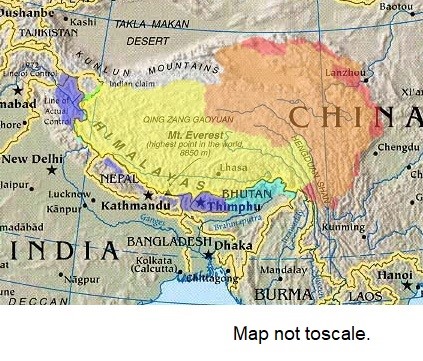China collecting DNA samples from across Tibet, says rights group

Chinese authorities have been gathering DNA samples across Tibet, including from kindergarten children without the apparent consent of their parents, Human Rights Watch has said.
In a new report released on Monday, the rights organisation claimed new evidence showing a systematic DNA collection drive for entire populations across Tibet as part of a “crime detection” drive.
“There is no publicly available evidence suggesting people can decline to participate or that police have credible evidence of criminal conduct that might warrant such collection,” it said, adding that mass collection for such a purpose was a serious human rights violation in that it “cannot be justified as necessary or proportionate”.
The DNA collection drives described in Monday’s report began in 2019 under a policing campaign called the “three greats” (inspection, investigation and mediation), designed to strengthen China’s intensive grassroots-level policing system. The report also cited two government tenders for the construction of local DNA databases in 2019.
Citing publicly available police and state media publications, Human Rights Watch identified drives in 14 distinct localities across every prefecture-level region in the Tibetan Autonomous Region (TAR), including one whole prefecture, two counties, two towns, two townships and seven villages. It also detected some collection drives on Tibetan regions outside the TAR.
The report described the campaign as “intrusive policing”, taking samples from all residents of some villages, including those as young as five, or of all male residents. In a January report, police described efforts in Chonggye county to conduct information registration and DNA collection.
“No village must be omitted from a township, no household must be omitted from a village, and no person must be omitted from a household,” it said.
Tibet has been under Chinese control since it was annexed more than 70 years ago, in what Tibetans describe as an invasion and Beijing claims was a peaceful liberation from theocratic rule. It is among border regions including Xinjiang and Mongolia subject to long-running crackdowns on the religious and cultural practices of non-Han ethnic minorities.
In April police in Nyemo county, Lhasa municipality, collected DNA from entire classes of children at three kindergartens, the report said, with no suggestion in the publicly available reports that parents were involved in the consent process.
It said the stated purpose of “crime detection” didn’t appear to be legitimate or proportionate, or in the child’s best interests, and the extraction of DNA in a school setting without the consent of caregivers or an apparent option to refuse was a violation of the children’s privacy.
One publicly available report on the school collection drive said police had “promptly eliminated the doubts and concerns of the masses and obtained the support and understanding of the collected persons” by explaining “the necessity and importance of DNA samples collected by the public security organs”.
Human Rights Watch said government DNA collection was sometimes justified as an investigative tool but must be “comprehensively regulated, narrow in scope and proportionate to meeting a legitimate security goal”.
“DNA information is highly sensitive and can facilitate a wide array of abuses if collected or shared non-consensually,” it said.
The researchers said the TAR campaign was similar in scope to DNA collection drives in Xinjiang, which targeted communities en masse rather than individual cohorts of concern, such as recently released prisoners, as occurred elsewhere in China.
China’s DNA collection has caused concern among rights groups in the past. In 2000 the government began a national DNA database, which contains data from at least 40 million individuals. In 2017 Human Rights Watch said Chinese law appeared to limit collection of DNA samples to people connected with a specific criminal case, but police had conducted campaigns to gather DNA biometric information from regular citizens for an “unspecified need to ‘solve crimes’.”
The rights group said any compelled collection or government use was a “serious intrusion on the right to privacy”.
“Coercing people to give blood samples, or taking blood samples without informed, meaningful and freely given consent or justification, can violate an individual’s privacy, dignity and right to bodily integrity.”
China’s ministry of foreign affairs press representative for Tibet declined to comment.
by Helen Davidson in The Guardian, Sept 6, 202
-
Book Shelf
-
 Book Review
DESTINY OF A DYSFUNCTIONAL NUCLEAR STATE
Book Review
DESTINY OF A DYSFUNCTIONAL NUCLEAR STATE
- Book ReviewChina FO Presser Where is the fountainhead of jihad?
- Book ReviewNews Pak Syndrome bedevils Indo-Bangla ties
- Book Review Understanding Vedic Equality….: Book Review
- Book Review Buddhism Made Easy: Book Review
- Book ReviewNews Elegant Summary Of Krishnamurti’s teachings
- Book Review Review: Perspectives: The Timeless Way of Wisdom
- Book ReviewNews Rituals too a world of Rhythm
- Book Review Marx After Marxism
- Book Review John Updike’s Terrorist – a review
-
-
Recent Top Post
-
 NewsTop Story
What Would “Total Victory” Mean in Gaza?
NewsTop Story
What Would “Total Victory” Mean in Gaza?
-
 CommentariesTop Story
The Occupation of Territory in War
CommentariesTop Story
The Occupation of Territory in War
-
 CommentariesTop Story
Pakistan: Infighting in ruling elite intensifies following shock election result
CommentariesTop Story
Pakistan: Infighting in ruling elite intensifies following shock election result
-
 CommentariesTop Story
Proforma Polls in Pakistan Today
CommentariesTop Story
Proforma Polls in Pakistan Today
-
 CommentariesTop Story
Global South Dithering Away from BRI
CommentariesTop Story
Global South Dithering Away from BRI
-
 News
Meherabad beckons….
News
Meherabad beckons….
-
 CommentariesTop Story
Hong Kong court liquidates failed Chinese property giant
CommentariesTop Story
Hong Kong court liquidates failed Chinese property giant
-
 CommentariesTop Story
China’s stock market fall sounds alarm bells
CommentariesTop Story
China’s stock market fall sounds alarm bells
-
 Commentaries
Middle East: Opportunity for the US
Commentaries
Middle East: Opportunity for the US
-
 Commentaries
India – Maldives Relations Nosedive
Commentaries
India – Maldives Relations Nosedive
-
AdSense code



















